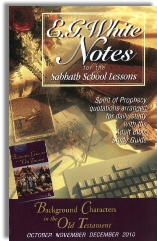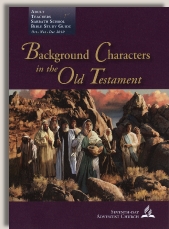|
||||||||||||||
Commentary on "Rizpah: The Influence of Faithfulness"
Day 4: Tuesday, November 23, 2010 - An Eye for an Eye or a Convenient Solution?
Overview
The Lesson’s title asks, is the bloody story told in II Samuel 21:1-14, “an eye for an eye, or a convenient solution?” There is some debate among the scholars over questions of collective vs. individual justice. Some say David used the famine as a convenient excuse to take out his rivals. However, the scriptures do not indicate this, the Lesson states, for we see that Saul had attempted to exterminate the Gibeonites.
Our decisions and actions affect others, as the good and bad decisions of Israel’s kings had positive or destructive effects on Israel as a whole. The Lesson concludes that God expects us to honor our promises, and Rizpah sets a good example of faithfulness.
Observations
When Saul was king, he had abused his kingly “zeal for the people of Israel” against the Gentile minority, the Gibeonites. This tribe had now lived peaceably in Benjamite territory for 400 years until Saul’s reign. More disturbing, the Gibeonites were Saul’s neighbors, living in his own town of Gibeah. He had grown up amongst them and had probably known many by name, and apparently harbored a lifetime of hatred against them. The scripture says that he was motivated by his patriotic zeal, and he tried to exterminate them.
God held the nation of Israel responsible for Saul’s sin, and also gave them a chance to repent for the sin of their king. When they did not repent, God sent famine. After three consecutive years of no rain, David realized that God’s hand was against them, and he enquired of the Lord. The answer is blunt in the King James Version, “It is for Saul, and for his bloody house, because he slew the Gibeonites (II Sam 21:1).” The famine was not only because of Saul, but for his “house,” implicating his sons or grandsons in the mass murder.
We now come to the painful part of this strange story, and its severity brings to the surface our deepest assumptions about God’s character. David asked the Gibeonites, (vs. 3), “how shall I make atonement, that you may bless the inheritance of the Lord?” David took a grave risk here, for the Gibeonites might have exacted a full “life-for-a-life” vengeance (Deut. 19:21), requiring an Israelite life for each son of Gibeon murdered by Saul. They might have asked to be released from their covenant with Israel along with some very costly restitution. Even so, David wanted to make atonement, knowing this would not be easy. Their request showed great restraint. They didn’t want money or land, because they understood the difference between a mere payoff and genuine atonement. They said, “The man who consumed us and planned to destroy us…let seven of his sons be given to us, so that we may hang them before the Lord at Gibeah of Saul, the chosen of the Lord (vss. 5,6).” The king said, “I will give them.”
David did not make the assumption, as so many modern Christians have, that atonement merely means reconciliation. The word in Hebrew is kaphar, meaning “to cover over, pacify, make propitiation (Strong’s Hebrew Dictionary, Biblos, http://strongsnumbers.com/hebrew/3722a.htm). The exact meaning becomes clear in the type of atonement David and the Gibeonites agreed upon. This was to be a propitiation, a substitutionary payment of blood that could reconcile all. They would accept only this as justice.
In David’s first question to the Gibeonites, he showed a strong awareness of God’s covenantal justice. He wanted atonement made so that “you may bless the heritage of the Lord.” This is a curious reversal of the Abrahamic Covenant, where those who bless Israel will be blessed. Here, Israel would be blessed only after the Gibeonite Gentiles blessed them.
This atonement was to be made “before the Lord”, meaning, this wasn’t to be done just to satisfy the Gibeonite desire for vengeance, but to carry out God’s will and ultimately satisfy Him. Their acknowledgement of God was very telling, because they might have held resentment against the God of the Israelites, their persecutors. The execution was to be performed in the sight of Saul’s city, before his people, and in the presence of the Lord. The statement made to all would be unmistakable.
The Gibeonite demand was an appeal to the covenant that Joshua had made with them 400 years before. Their hope in the covenant-keeping God would bear fruit. They wanted the land to be blessed by God, and they wanted their place in it. The God of Abraham, Isaac, and Jacob had also dwelt among these Gentiles, and He heard their cries.
Summary
- The Gibeonites lived in Saul’s own city and were his neighbors.
- Saul’s slaughter of the Gibeonites involved his family, provoking God to call the house of Saul a “bloody house.”
- When David asked how he could make atonement for the sins against them, the Gibeonites’ request showed restraint. Instead of demanding much money or bloodshed, they asked for a substitutionary atonement of blood that would reconcile all.
- In a reversal of the Abrahamic Covenant, a blessing by the Gibeonites was needed for Israel to realize their promised covenantal blessings.
- The seven sons were to be executed in the presence of Israel and the Lord, showing that the the land was to be released from the curse brought by Saul’s bloody house.
- Gibeon appealed to the covenant-keeping God who had also dwelt among them, and He heard them.
Copyright 2010 BibleStudiesForAdventists.com. All rights reserved. November 21, 2010. This website is published by Life Assurance Ministries, Glendale, Arizona, USA, the publisher of Proclamation! Magazine. Contact email: BibleStudiesForAdventists@gmail.com.
The Sabbath School Bible Study Guide and the corresponding E.G. White Notes are published by Pacific Press Publishing Association, which is owned and operated by the Seventh-day Adventist church. The current quarter's editions are pictured above.
Official Adventist Resources
Standard Edition Study Guide Week 9
Teacher's Edition Study Guide Week 9
Easy Reading Edition Study Guide Wk 9
Search the Complete Published Ellen G. White Writings


